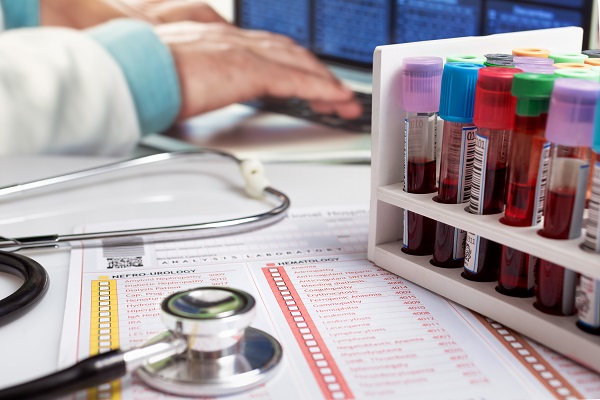Hematology Treatment for Blood Cancers

Hematology treatment is typically recommended for those dealing with blood cancers. Also known as hematologic cancers, blood cancers begin where blood is produced: the bone marrow. A person has blood cancer when abnormal blood cells begin to interfere with the function of healthy blood cells, like the creation of new healthy cells and fighting off infections.
There are three main types of blood cancers: myeloma, lymphoma, and leukemia. Leukemia is a form of cancer that leads to the production of abnormal white blood cells. The condition also hinders the bone marrow's ability to create healthy blood cells and platelets.
Lymphoma is typically broken down into two categories. Non-Hodgkin's lymphoma starts in the lymphatic system and interferes with white blood cells' function. Hodgkin's lymphoma also develops in the lymphatic system, but it is characterized by abnormal lymphocyte cells.
Myeloma is a blood cancer that starts in the plasma cells in the blood. It also weakens the immune system since it affects the production of healthy blood cells.
Getting hematology treatments for blood cancers
Blood cancers are serious medical conditions that are typically easier to treat when detected early on. Some of the signs and symptoms of blood cancers include:
- Persistent fatigue
- Night sweats
- Fever
- Nausea
- Loss of appetite
- Weight loss
- Joint pain
- Headaches
- Shortness of breath
- Abdominal pain
- Itchy skin
- Frequent infections
- Shortness of breath
Diagnosing patients with blood cancer typically starts with the hematologist going over the patient's medical history and performing a physical examination. The oncologist pays extra attention to the patient's lymph nodes and body, looking for signs of bruising or infection.
Various tests might be ordered up to help with the diagnosis. A biopsy might also be performed to test samples for different cancers. For example, a lymph node biopsy is used to diagnose lymphoma. A bone marrow aspirator can be used to collect samples from bone, blood, or bone marrow. The sample can then be sent to a lab to check for changes in genetic material or abnormal cells.
Imaging scans can also help with the diagnosis of blood cancers. They can be used to detect an enlarged lymph node, a symptom of lymphoma. However, not all blood cancers cause tumors. For example, people with leukemia typically do not have any visible tumors.
Some of the imaging tests that help diagnose blood cancers include X-rays, ultrasounds, CT scans, MRIs, and PET scans. Blood tests can be used to evaluate the different components that make up blood like platelets, red blood cells, and white blood cells. A blood chemistry test measures the levels of critical components in a patient's blood. Abnormal levels of some proteins might be a sign of cancer.
Treatment options
Factors like a patient's age, how fast the disease progresses, and the type of cancer dictate how an oncologist recommends treating it. Some of the hematology treatments a hematologist might recommend for patients with blood cancers include:
- Stem cell transplants: This involves infusing healthy stem cells into a patient's body. The stem cells might be collected from umbilical cord blood, blood that is circulating, or the bone marrow
- Chemotherapy: This treatment involves providing patients with medications that kill cancer cells. Patients typically receive a cocktail of drugs they take daily. Chemotherapy is sometimes combined with other treatments like stem cell therapy
- Radiation therapy: This involves using x-rays to kill cancer cells. It also provides pain relief to patients dealing with discomfort. Radiation can be used as a standalone treatment or combined with other treatments like stem cell transplants
Frequently asked questions about blood cancer treatment options
Let us go over the answers to some of the questions you might have about getting treatment for hematologic cancers:
1. Can leukemia in children be cured?
Yes, the goal of leukemia treatments is to destroy abnormal cells so normal ones can restore their function and form. The American Cancer Society considers patients who have been free of leukemia for at least five years cured.
2. Do blood cancers always need treatment?
Depending on the type of hematologic cancer a patient has, their doctor might recommend an 'observe and wait' approach. For example, people with the early stages of blood cancers like chronic lymphocytic leukemia might not need treatments for years as long as there are no severe effects on the body. However, patients still need to be closely monitored by their hematologist to determine when hematology treatment is needed.
Life goes on after a cancer diagnosis
Our oncologist has years of experience helping to restore the health of people with blood cancer. Give us a call or stop by our Marlton clinic to set up an appointment.
Request an appointment here: https://lindenbergcancer.com or call Lindenberg Cancer & Hematology Center at (856) 475-0876 for an appointment in our Marlton office.
Check out what others are saying about our services on Yelp: Hematology in Marlton, NJ.
Recent Posts
Hematologic disease treatment often begins long before a formal diagnosis, because the earliest warning signs appear in everyday life. Fatigue, easy bruising, or frequent infections may not seem serious at first, yet they sometimes indicate that the blood, bone marrow, or lymphatic system needs attention. Understanding which symptoms matter, how long they last, and when…
Searching for chemotherapy near me often begins when a patient receives a new cancer diagnosis and needs to understand the next steps in care. Chemotherapy uses powerful medications to slow or stop the growth of cancer cells, and knowing what to expect helps reduce uncertainty. When patients feel prepared, they often experience treatment with more…
At a dedicated cancer treatment center, individuals can find hope in specialized medical care that can improve their overall health and treatment outcomes. These centers provide advanced therapies to improve health and quality of life while also offering compassionate support for patients and their families as they navigate through a scary time in their lives.…
Gynecological cancer treatment is a complex and often emotionally challenging journey. Patients and their families frequently have questions and concerns about available options, potential side effects, and long-term outcomes. The following guide provides answers to some of the most common questions about gynecological cancer and what you can expect from the treatment process.According to Johns…


